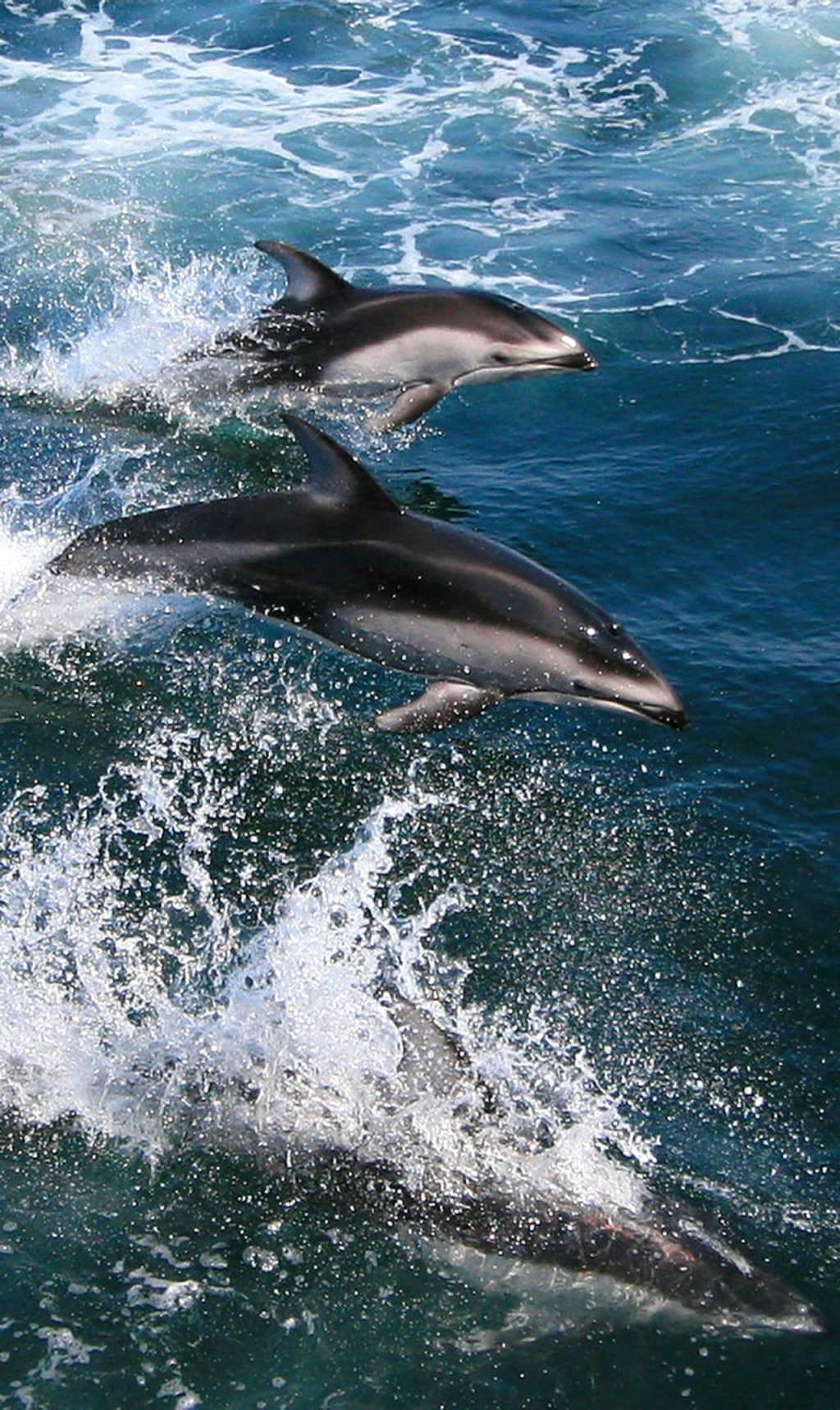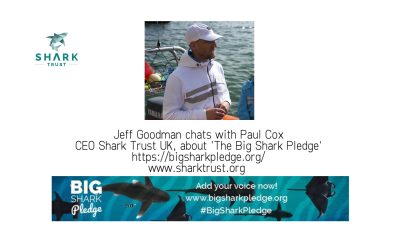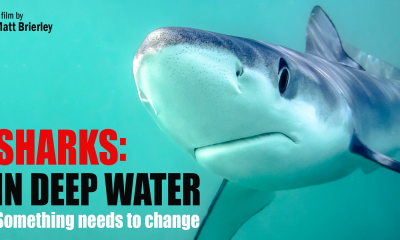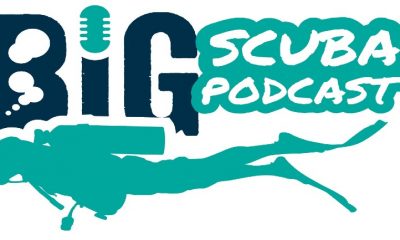News
How Do Marine Mammals Avoid the Bends?
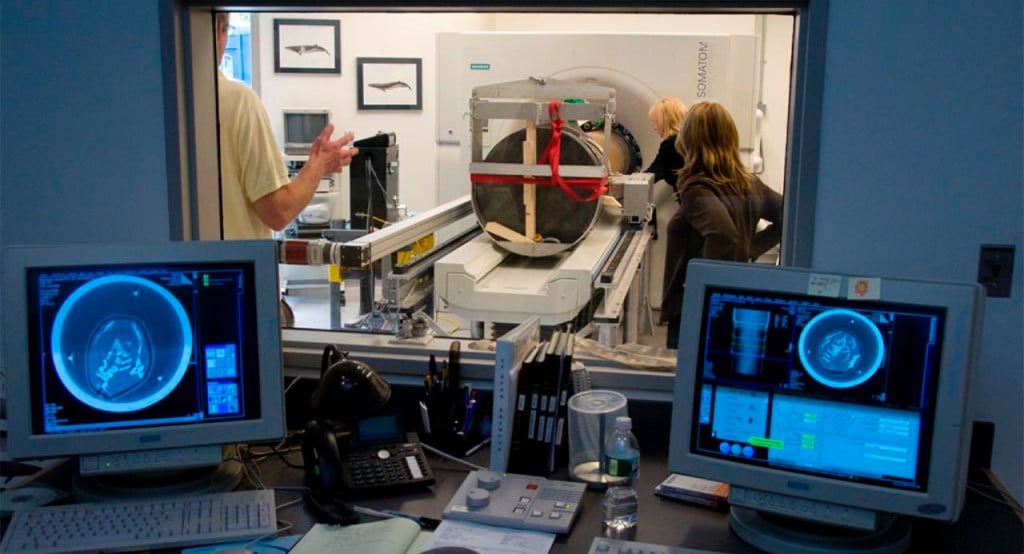
Study offers new hypothesis and highlights role that sonar plays in strandings
Deep-diving whales and other marine mammals can get the bends—the same painful and potentially life-threatening decompression sickness that strikes scuba divers who surface too quickly. A new study offers a hypothesis of how marine mammals generally avoid getting the bends and how they can succumb under stressful conditions.
The key is the unusual lung architecture of whales, dolphins and porpoises (and possibly other breath-holding diving vertebrates), which creates two different pulmonary regions under deep-sea pressure, say researchers at the Woods Hole Oceanographic Institution (WHOI) and the Fundacion Oceanografic in Spain. Their study was published April 25, 2018, in the journal Proceedings of the Royal Society B.
“How some marine mammals and turtles can repeatedly dive as deep and as long as they do has perplexed scientists for a very long time,” says Michael Moore, director of the Marine Mammal Center at WHOI and co-author of the study. “This paper opens a window through which we can take a new perspective on the question.”
When air-breathing mammals dive to high-pressure depths, their lungs compress. That collapses their alveoli—the tiny sacs at the end of the airways where gas exchange occurs. Nitrogen bubbles build up in the animals’ bloodstream and tissue. If they ascend slowly, the nitrogen can return to the lungs and be exhaled. But if they ascend too fast, the nitrogen bubbles don’t have time to diffuse back into the lungs. Under less pressure at shallower depths, the nitrogen bubbles expand in the bloodstream and tissue, causing pain and damage.
Marine mammals’ chest structure allows their lungs to compress. Scientists have assumed that this passive compression was marine mammals’ main adaptation to avoid taking up excessive nitrogen at depth and getting the bends.
In their study, the researchers took CT images of a deceased dolphin, seal, and a domestic pig pressurized in a hyperbaric chamber. The team was able to see how the marine mammals’ lung architecture creates two pulmonary regions: one air-filled and the other collapsed. The researchers believe that blood flows mainly through the collapsed region of the lungs. That causes what is called a ventilation-perfusion mismatch, which allows some oxygen and carbon dioxide to be absorbed by the animal’s bloodstream, while minimizing or preventing the exchange of nitrogen. This is possible because each gas has a different solubility in the blood. The terrestrial pig did not show that structural adaptation.
This mechanism would protect cetaceans from taking up excessive amounts of nitrogen and thus minimize risk of the bends, says lead author Daniel García-Parraga of the Fundacion Oceanografic. However, he said, “Excessive stress, as may occur during exposure to human-made sound, may cause the system to fail and increase blood to flow to the air-filled regions. This would enhance gas exchange, and nitrogen would increase in the blood and tissues as the pressure decreases during ascent.”
Scientists once thought that diving marine mammals were immune from decompression sickness, but a 2002 stranding event linked to navy sonar exercises revealed that 14 whales that died after beaching off the Canary Islands had gas bubbles in their tissues—a sign of the bends. The researchers say the paper’s findings could support previous implications of decompression sickness in some cetacean mass strandings associated with navy sonar exercises.
The team says further research will require the development of tools to analyze how lung blood flow and ventilation patterns change with various stressors during diving.
This work was supported by funding from the Fundacion Oceanografic and the Office of Naval Research.
The Woods Hole Oceanographic Institution is a private, non-profit organization on Cape Cod, Mass., dedicated to marine research, engineering, and higher education. Established in 1930 on a recommendation from the National Academy of Sciences, its primary mission is to understand the ocean and its interaction with the Earth as a whole, and to communicate a basic understanding of the ocean’s role in the changing global environment.
For more information, please visit www.whoi.edu.
News
Dive Worldwide Announces Bite-Back as its Charity of the Year

Over the next 12 months, specialist scuba holiday company Dive Worldwide will be supporting Bite-Back Shark & Marine Conservation with donations collected from client bookings to any one of its stunning dive destinations around the world. The independently-owned operator expects to raise £3000 for the UK charity.
Manager at Dive Worldwide, Phil North, said: “We’re especially excited to work with Bite-Back and support its intelligent, creative and results-driven campaigns to end the UK trade in shark products and prompt a change in attitudes to the ocean’s most maligned inhabitant.”
Bite-Back is running campaigns to hold the media to account on the way it reports shark news along with a brand new nationwide education programme. Last year the charity was credited for spearheading a UK ban on the import and export of shark fins.
Campaign director at Bite-Back, Graham Buckingham, said: “We’re enormously grateful to Dive Worldwide for choosing to support Bite-Back. The company’s commitment to conservation helps set it apart from other tour operators and we’re certain its clients admire and respect that policy. For us, the affiliation is huge and helps us look to the future with confidence we can deliver against key conservation programmes.”
To launch the fundraising initiative, Phil North presented Graham Buckingham with a cheque for £1,000.
Visit Dive Worldwide to discover its diverse range of international scuba adventures and visit Bite-Back to learn more about the charity’s campaigns.
MORE INFORMATION
Call Graham Buckingham on 07810 454 266 or email graham@bite-back.com
Gear News
Scubapro Free Octopus Promotion 2024
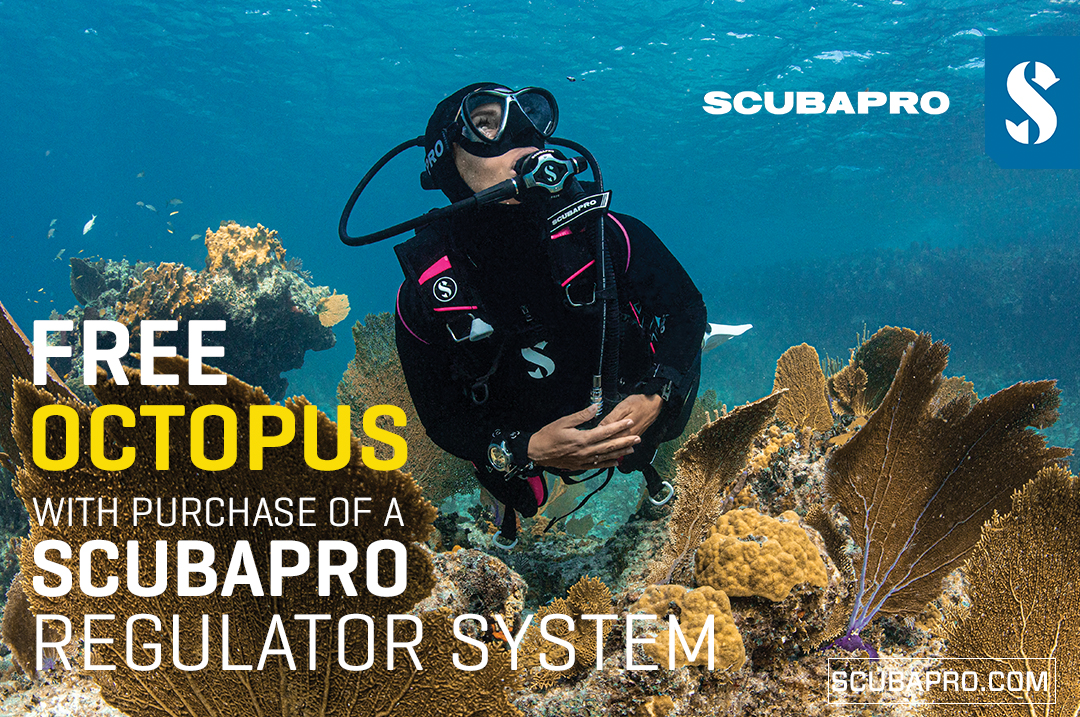
Free Octopus with every purchase of a SCUBAPRO regulator system
Just in time for the spring season, divers can save money with the FREE OCTOPUS SPRING PROMOTION! Until July 31st SCUBAPRO offers an Octopus for free
with every purchase of a regulator system!
Get a free S270 OCTOPUS with purchase of these combinations:
MK25 EVO or MK19 EVO with A700
MK25 EVO or MK19 EVO with S620Ti
MK25 EVO or MK19 EVO with D420
MK25 EVO Din mit S620Ti-X
Get a free R105 OCTOPUS with purchase of the following combinations:
MK25 EVO or MK19 EVO with G260
MK25 EVO or MK17 EVO with S600
SCUBAPRO offers a 30-year first owner warranty on all regulators, with a revision period of two years or 100 dives. All SCUBAPRO regulators are of course certified according to the new European test standard EN250-2014.
Available at participating SCUBAPRO dealers. Promotion may not be available in all regions. Find an authorized SCUBAPRO Dealer at scubapro.com.
More information available on www.scubapro.com.
-

 News3 months ago
News3 months agoHone your underwater photography skills with Alphamarine Photography at Red Sea Diving Safari in March
-

 News3 months ago
News3 months agoCapturing Critters in Lembeh Underwater Photography Workshop 2024: Event Roundup
-

 Marine Life & Conservation Blogs3 months ago
Marine Life & Conservation Blogs3 months agoCreature Feature: Swell Sharks
-

 Blogs2 months ago
Blogs2 months agoMurex Resorts: Passport to Paradise!
-

 Blogs2 months ago
Blogs2 months agoDiver Discovering Whale Skeletons Beneath Ice Judged World’s Best Underwater Photograph
-

 Gear Reviews2 weeks ago
Gear Reviews2 weeks agoGEAR REVIEW – Revolutionising Diving Comfort: The Sharkskin T2 Chillproof Suit
-

 Marine Life & Conservation2 months ago
Marine Life & Conservation2 months agoSave the Manatee Club launches brand new webcams at Silver Springs State Park, Florida
-

 Gear Reviews3 months ago
Gear Reviews3 months agoGear Review: Oceanic+ Dive Housing for iPhone


